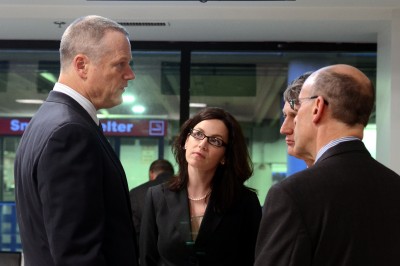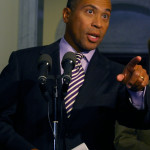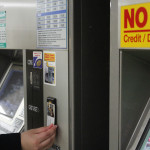Massachusetts Gov. Charlie Baker held a press conference at Logan International Airport following a meeting with U.S. Vice President Joe Biden and Federal Emergency Management Agency Associate Administrator Beth Zimmerman Monday.

Earlier in the day, U.S. President Barack Obama declared a disaster in Massachusetts due to the effects of the unprecedented winter storms that blasted the state during the 2014-15 season, according to a Monday press release.
Obama called for federal aid to provide relief to facilities that experienced damage in the counties of Barnstable, Bristol, Dukes, Essex, Middlesex, Nantucket, Norfolk, Plymouth, Suffolk, and Worcester, the release stated.
Baker arrived in Boston on a delayed flight from Washington, D.C. around 7:20 p.m.
In his press conference, Baker described receiving federal storm relief funds as a two-step process.
“Step number one in the process is the declaration. Step number two is a review of all the documentations associated with [those] who qualify for reimbursement,” he said.
Also present at Monday’s press conference were Massachusetts State Public Safety Secretary Daniel Bennett, Emergency Management Agency Director Kurt Schwartz and Emergency Management Agency Deputy Director Christine Packard.
Baker said that federal reimbursements will not meet previous expectations.
“Remember, most of this money has already been spent,” Baker said. “It’s been spent by state governments. It’s been spent by local governments. It’s been spent by hospitals and social service agencies and insurers in many cases as well.”
Baker estimated that the first storm that hit the state in late January cost the Commonwealth somewhere between $80 to $90 million dollars. He added that damage to things such as public transportation makes the Commonwealth eligible for federal funding.
Baker said that he understands the urgency of Obama’s disaster declaration.
“I didn’t think it was a tough sell, because I was living through this all the way through that period of time,” he said. “However, there’s a lot of snow that falls around the rest of the country as well, and I think from the federal government’s point of view, we were pretty aware that what we were seeking would be precedential, but our argument was that this storm was reasonably unprecedented.”
Schwartz said requests for relief funds are considered on a case-by-case basis, and requests for fund allocation will now begin.
“We’ll move forward on two fronts,” Schwartz said. “We received the declaration today [Monday], so we will immediately begin working on that declaration, [so] we will hold briefings with cities, towns, state agencies and non-profits starting probably in two weeks.”
Schwartz said requests for funding will be reviewed over the next 30 to 45 days, and that Baker will ultimately decide how to mediate requests with FEMA.
Schwartz said when it comes to appeals, the ultimate decision about funds must be made by Baker.
“All options are open to the governor in terms of the appeal, [the] appeal back to FEMA. The appeal can be a request to just reconsider the decision they’ve already made or it would be a different request to FEMA, so there’s a lot of latitude on what the governor would do,” Schwartz said.
Based on the conversations he had during his Washington trip, Baker said collaborating with members of U.S. Congress is another option he is considering.
“From my point of view, we’ve spent a lot of time with the congressional delegation. The congressional delegation in my opinion, spent a lot of time doing advocacy on their own,” Baker said. “I thought they were terrific today with the meeting with FEMA and the meeting with the vice president, and we’ll certainly pursue whatever options are available to us.”
Baker emphasized the need to start to collecting data and documentation as soon as possible.
“At this point in time, I certainly want to get started on making sure that we collect the data and documentation we need to get reimbursed for the stuff associated with this particular declaration,” he said. “I would say that at this point, we are pursuing a more aggressive and in some light, unusual request, but the good news is we have an opportunity to get started on a declaration, and we’re going to do that.”




